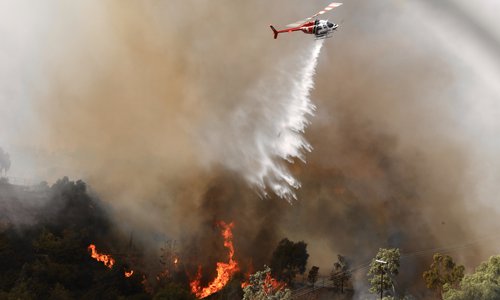HOME >> WORLD
PG&E blackouts reveal mismanaged concern over public safety
By Lance Crayon Source:Global Times Published: 2019/10/17 21:03:41

A helicopter pours water to the wildfire in El Sereno, Los Angeles on October 11. Last week, three people died after wind-driven wildfires burned through 8,300 acres in Southern California, forcing at least 100,000 residents to evacuate their homes as firefighters sought to contain the fast-moving blazes. Photo: Yu Yan/GT
Recovery efforts are still underway in Northern California from last year's Camp Fire that devoured the Town of Paradise and most of nearby Magalia and Concow. Upon the eve of the first anniversary of the worst fire in state history, the company who was found responsible is in the headlines again, and for similar reasons: public safety.Pacific Gas & Electric (PG&E), on October 9, implemented rolling blackouts in the northern central regions of the state. The company ordered them as 60 mph winds ripped through towns while jeopardizing power lines, which were ruled to be the cause of Camp Fire. By turning off power the risk of fire is reduced. California has been using this tactic for almost 20 years, and many feel it's for a better solution.
Beginning Wednesday, PG&E implemented Public Safety Power Shutoffs (PSPS) in the state's northern and central regions. By Saturday, roughly two million residents and business owners had been affected. The company said the decision was aimed at reducing wildfire risk as 60 mph winds swept through the state.
However, according to Mark Toney, executive director of consumer protection group Utility Reform Network, said in a Los Angeles Times report that the move was a "total overreaction" as the winds weren't as strong as predicted.
The company announced the rolling blackouts on Tuesday but failed to give a fair estimate on how many would be affected. The next day, 800,000 residents and business owners were without power. The company's phone lines were jammed, and their website eventually crashed.
California Governor Gavin Newsom, usually quick to blame the Trump administration for the state's more serious problems, couldn't help but acknowledge who the real culprit was this time and told reporters, "I'm outraged." And understandably so, given that wine harvesting is underway. Newsom's PlumpJack winery, located in Oakville, north of San Francisco, was affected. When PG&E turns off the power as a safety precaution, it is not obligated to reimburse businesses.
Newly appointed PG&E CEO Bill Johnson admitted in one interview that the PSPS was a "colossal mistake." Johnson also later said, "I want to apologize to every one of our customers," and said the PSPS was "insensitive, inappropriate, tone-deaf are the terms I would use to describe this." At one point, the company tried to put the blame on climate change.
What can be observed is how PG&E is not only financially bankrupt but morally empty as well. Rolling blackouts are an antiquated response, but at the moment there doesn't seem to be a better method.
Newsom acknowledged the company didn't have a choice to issue the blackouts, but since then, many have disagreed. The governor later told reporters the company is bankrupt because of "terrible management going back decades." Last year, when US President Donald Trump said the November fires were a result of mismanagement, many people didn't believe him. Now that Newsome is using the same word, maybe more will listen.
California is home to more electric car owners than any US state. Tesla CEO Elon Musk was active on Twitter providing safety and recharging information to his customers. Meanwhile, senior citizens were also concerned, especially those with diabetes who need to keep their insulin refrigerated to stay alive.
RELATED ARTICLES:
Posted in: MORE NEWS